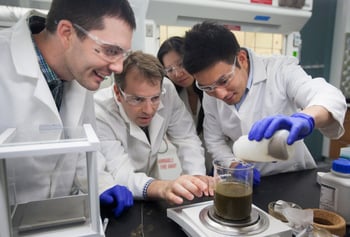In biotechnology, one man’s trash is very often another man’s treasure. We’ve seen prime examples of this with the chlorine-eating bacteria developed at the University of Minnesota and the anaerobic digester at MSU which produces renewable energy from the biowaste of the campus. Now a consortium spearheaded by the University of Wisconsin-Madison is working on turning the problem of dairy farm manure into solutions to other problems.
The sheer amount of manure produced at large dairies creates a problem when it comes to managing the waste. There’s simply too much to be put to good use, which means that a large amount of time, money, and water must be spent making sure the manure doesn’t lead to pollution or other environmental problems. To solve this problem, the consortium researched other manure processing techniques that might be more cost effective or efficient.

(Consortium researchers Jamison Watson, Troy Runge, Kim Huong Pham, and Zong Liu work on a manure sample. Image courtesy University of Wisconsin)
The solution that the consortium has put forward does even better: not only does it reduce the cost, but it also creates several valuable materials from the manure and can even recycle the water used in the process. This solution uses a manure separation technique to extract the useful components, such as: small plant fibers, which can be converted into biogas, large plant fibers, which can be used to make mulch or ethanol, liquids which can be used as fertilizer, and solids which can be converted into bioplastics.
 "This is a triple-win situation," says project collaborator Tom Cox (image left, courtesy University of Wisconsin), a professor of agricultural economics in the College of Agriculture and Life Sciences. "We would like to make money by doing the right thing by the environment and society,"he adds in a UW article.
"This is a triple-win situation," says project collaborator Tom Cox (image left, courtesy University of Wisconsin), a professor of agricultural economics in the College of Agriculture and Life Sciences. "We would like to make money by doing the right thing by the environment and society,"he adds in a UW article.
This solution is only the first of many to come from the Wisconsin consortium. It’s part of a larger project to research effective uses for manure, which is funded by a $7 million grant from United States Department of Agriculture's Biomass Research and Development Initiative. The University of Wisconsin, Madison has a thriving research and development sector which attracts $1 billion in grants each year. For further reading regarding funding for the University of Wisconsin, Madison and its studies, click on the link below:
Biotechnology Calendar, Inc. visits the University of Wisconsin campus for two of our BioResearch Product Faire™ events each year. Coming up in 2015 are our Madison University Research Park BioResearch Product Faire™ on July 16th, 2015, immediately followed by our Madison BioResearch Product Faire™ on July 17th, 2015. To attend one or both of these events, please click the button below. If you’re interested in attending a show closer to home, please look at our 2015 schedule of events.



